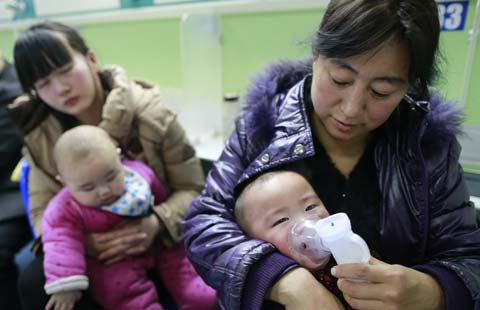

Babies receive treatment at a hospital in Beijing on Friday. The number of patients, especially newborns, with respiratory illnesses has increased in recent days, as local authorities have issued warnings for "heavy air pollution". Feng Yongbin / China Daily
Authorities in Guangzhou are planning to introduce state-of-the-art technology to upgrade coal-fired power plants and industrial boilers as part of major efforts to tackle air pollution, the city's mayor said.
Mayor Chen Jianhua said after the conclusion of the annual local legislative session on Saturday that the advanced international technology, called lower temperature electrostatic precipitators, will be introduced to such power plants.
Industrial pollution, particularly emissions from coal-fired power plants and industrial boilers, accounts for about 33 percent of the PM2.5 in the city, while car emissions account for 23 percent, according to Chen.
"By July 1 next year, all power plants will be upgraded with the technology, which will help greatly reduce industrial emissions," Chen said.
After implementation of the technology, emissions of sulfur dioxide, oxynitride and fine dust, which are major particles forming the PM2.5 - airborne particles smaller than 2.5 microns in diameter - are expected to decrease by more than 60 percent, Chen said.
Guangzhou consumes more than 30 million metric tons of coal annually, according to Chen.
Moreover, the city will renovate 1,000 industrial boilers this year, requiring them to use electricity and liquefied natural gas.
"We will also implement tough measures to control emissions from vehicles and construction sites and roads," the mayor said.
According to a government work report, Guangzhou registered 260 days that met the air quality standard in 2013, or four more days than in 2012.
However, the city had only 25.8 percent of days in January with good air quality, down 12.9 percent year-on-year and 6.5 percent from December, according to the Ministry of Environmental Protection.
The Pearl River Delta, a booming manufacturing area in Guangdong province, reported 47.6 percent of days in January exceeding the quality standard.
"I can't figure out how much emissions will be reduced by implementing such series of measures to tackle air pollution, as we also need to introduce severe punishment for related departments and industries that are found to illegally discharge pollution," Chen said.
In January, the local authority announced another plan to tackle air pollution by implementing restrictions on car use.
According to the plan, when a red alert is issued, cars, including those from neighboring cities, will be banned from the road depending on whether their license plates end in odd or even numbers.
Also according to the plan, up to 20 percent of the city's government vehicles will be kept off the road during an orange alert.
The city has about 2.45 million vehicles, Chen said.
Govt imposes new emissions limits
2014-02-24China under pressure to meet emissions targets
2014-02-13Copyright ©1999-2018
Chinanews.com. All rights reserved.
Reproduction in whole or in part without permission is prohibited.